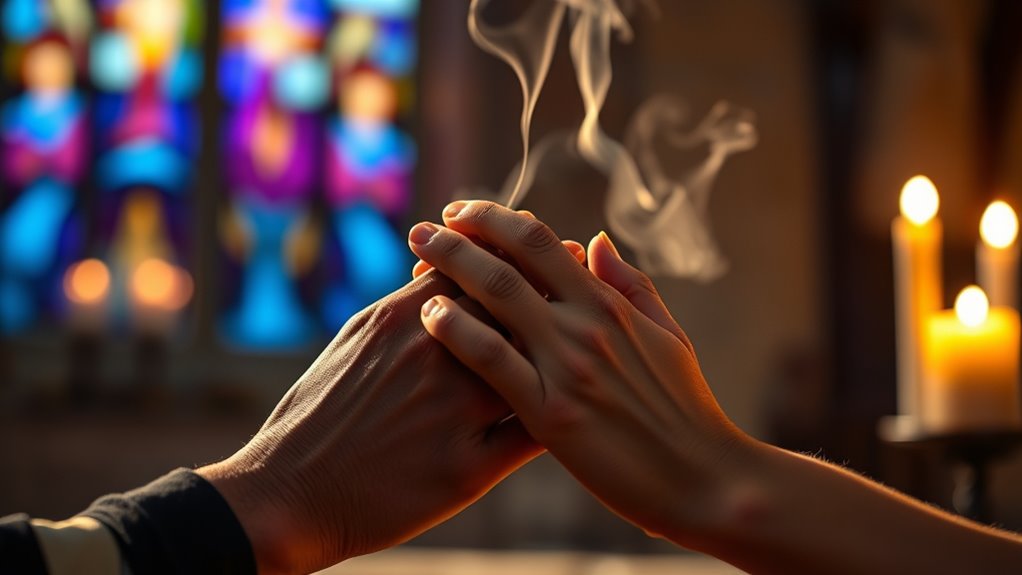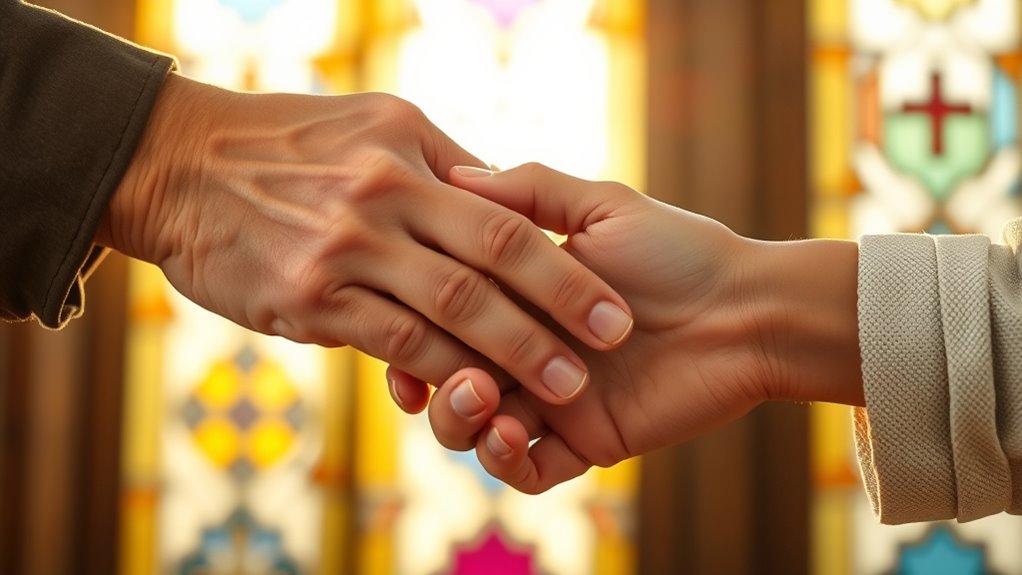Different faith traditions teach that forgiveness is essential for healing and restoring relationships. Many faiths emphasize divine mercy guiding human forgiveness, encouraging compassion without requiring apology. Rituals like prayer, meditation, and ceremonies help you release resentment and find inner peace. Balancing justice with mercy is crucial, helping you forgive while honoring moral boundaries. If you explore these spiritual lessons further, you’ll discover powerful ways to foster genuine reconciliation and emotional healing in your relationships.
Key Takeaways
- Faith traditions emphasize genuine remorse, accountability, and divine mercy as foundations for forgiving in relationships.
- Rituals like prayer, confession, or meditation help foster empathy, emotional release, and reconciliation.
- Balancing justice and mercy encourages maintaining boundaries while showing compassion and understanding.
- Inner spiritual growth through dedication and reflection enhances the capacity to forgive others.
- Forgiveness is viewed as a pathway to inner peace, healing, and social harmony within faith-based perspectives.
Understanding Forgiveness Across Different Faiths

Understanding forgiveness across different faiths reveals a rich tapestry of beliefs and practices that shape how people forgive. Cultural influences play a significant role, as each tradition develops unique forgiveness rituals reflecting their values. For example, in Buddhism, forgiveness is unconditional and often involves compassion, with reconciliation sometimes secondary. Hinduism links forgiveness to karma, emphasizing internal spiritual growth over social reconciliation. Judaism’s forgiveness rituals, like Teshuva, require sincere apology and focus on restoring relationships within community. Christianity emphasizes divine forgiveness, guiding believers to let go of revenge as a moral duty. Islam promotes mercy and forgiveness as virtuous acts, often without requiring an offender’s apology. These diverse approaches highlight how cultural context and religious rituals influence forgiveness practices worldwide. Additionally, understanding the transformative power of decluttering can help individuals create a mental space conducive to emotional healing and forgiveness.
The Connection Between Religious Dedication and Forgiving

When your religious dedication grows, it often deepens your capacity for mercy and forgiveness. Spiritual practices like prayer and meditation can strengthen your emotional resilience, making forgiveness more attainable. By embracing these rituals, you reinforce your commitment to compassion and understanding in your relationships. Additionally, drawing inspiration from heartfelt quotes or stories of mom – amazing life together can serve as powerful reminders of love, legacy, and the importance of forgiveness in nurturing meaningful connections.
Deepening Faith and Mercy
Deepening faith often strengthens your capacity to forgive, as religious dedication fosters a profound sense of compassion and moral responsibility. Sacred rituals, such as prayer or reflection, serve as powerful reminders of divine mercy and your moral virtues. Participating in these practices deepens your spiritual connection, encouraging humility and empathy toward others. As your faith grows, you internalize teachings that emphasize forgiveness as a moral virtue essential to spiritual development. This commitment to your faith guides your responses to offenses, making forgiveness a natural extension of your devotion. The more you engage in sacred rituals, the more your sense of mercy expands, aligning your actions with divine principles and reinforcing your ability to forgive even the most challenging transgressions. Incorporating self-reflection practices into your routine can further enhance your understanding of forgiveness and compassion.
Spiritual Practices Promote Forgiveness
Engaging in spiritual practices like prayer, meditation, and reflection can profoundly strengthen your ability to forgive others. Sacred rituals, such as prayer and meditation practices, create intentional moments to connect with your faith and inner compassion. These practices help you cultivate empathy, reduce resentment, and foster a sense of divine mercy. Meditation practices, in particular, enable you to calm the mind, reflect on forgiveness, and release negative emotions associated with offenses. Regular engagement in these spiritual activities deepens your dedication, reinforcing the belief that forgiveness is a spiritual virtue. By dedicating time to sacred rituals, you nurture a forgiving mindset rooted in faith, making it easier to extend compassion and reconcile with those who have hurt you. Additionally, incorporating concentration techniques can enhance your focus during these practices, further supporting your journey toward forgiveness.
Divine Mercy and Human Forgiveness: A Spiritual Partnership

Divine mercy and human forgiveness form a profound partnership that shapes how you reconcile with others and yourself. This spiritual bond fosters a sense of forgiveness as social cohesion, transcending secular contexts to create harmony. When you accept divine mercy, you’re empowered to forgive, nurturing relationships and promoting peace. This partnership highlights that forgiveness isn’t just personal but collective, strengthening communities. Recognizing the importance of forgiveness in health, you can better understand how forgiveness impacts overall well-being and relationships.
Emotional Healing Through Faith-Based Forgiveness Practices

Faith-based forgiveness practices can help you find inner peace by releasing anger and resentment. They also build emotional resilience, allowing you to recover more quickly from hurtful experiences. By embracing spiritual methods, you can foster healing and strengthen your emotional well-being. Incorporating spiritual principles into your journey encourages compassion and understanding, which are essential for genuine forgiveness.
Inner Peace Cultivation
Have you ever considered how forgiveness practiced through spiritual or religious routines can help you find inner peace? Engaging in cultural rituals, like prayer, meditation, or ceremonies, directs your focus inward, fostering emotional healing. These routines often include forgiveness in art—visuals, music, or storytelling—that inspire compassion and understanding. By participating in such practices, you release resentment and cultivate a sense of calm. Forgiveness becomes more than a moral act; it’s a path to personal serenity. When you integrate faith-based rituals into your life, you align your emotional state with spiritual principles, reducing inner turmoil. This ongoing process nurtures inner peace, allowing you to move beyond pain and find harmony within yourself. Embracing minimalist aesthetics in these practices can further enhance clarity and emotional balance.
Emotional Resilience Building
Engaging in forgiveness practices rooted in spiritual traditions can considerably strengthen your emotional resilience. Cultural rituals, such as prayer, meditation, or ceremonies, reinforce your capacity to recover from hurt and loss. These rituals help you process emotions, shift focus from blame to compassion, and foster inner peace. Faith-based forgiveness often challenges common forgiveness myths, like the idea that forgiving means forgetting or excusing harmful behavior. Instead, it encourages you to release resentment and rebuild emotional strength through spiritual principles. By understanding that forgiveness is a process, not a one-time event, you develop resilience against future wounds. Recognizing the importance of emotional healing through faith-based forgiveness practices can deepen your capacity for compassion and growth. Embracing these practices empowers you to face pain with compassion, transforming suffering into spiritual growth and emotional stability.
When Reconciliation Is Not Possible: Spiritual Perspectives

When reconciliation isn’t possible, many spiritual traditions emphasize forgiveness as a personal act of inner peace and spiritual growth. You may face ethical dilemmas, such as whether to forgive without an apology or to let go despite unresolved issues. Cultural rituals often support this process, helping individuals find closure independently of the offender. Forgiveness in these contexts prioritizes your spiritual well-being over restoring the relationship, emphasizing inner liberation. Incorporating fraud detection techniques, such as anomaly analysis, can be a metaphor for recognizing and releasing negative emotions that hinder personal growth.
Balancing Justice and Mercy in Religious Forgiveness

You might wonder how to balance justice and mercy when forgiving in a religious context, especially when accountability feels essential. Religious teachings often emphasize divine mercy alongside justice, prompting you to contemplate how human forgiveness aligns with or differs from divine standards. Managing this balance can help you understand whether forgiveness means letting go entirely or maintaining a sense of accountability. Recognizing the importance of moral boundaries can guide you in navigating forgiveness without compromising your values.
Justice in Divine Mercy
How do divine figures reconcile the concepts of justice and mercy within their acts of forgiveness? They balance sacred forgiveness with justice, ensuring wrongdoers face consequences while receiving mercy. This harmony is evident in forgiveness rituals across faiths, where divine justice upholds moral order, and mercy offers healing. For example, in Christian belief, God’s mercy aligns with divine justice through Jesus’ sacrifice, embodying forgiveness that satisfies justice. Similarly, in Islam, Allah’s mercy coexists with justice, guiding believers to forgive without neglecting accountability. Below is a table illustrating how different traditions navigate this balance:
| Tradition | Approach to Justice & Mercy |
|---|---|
| Christianity | Divine justice fulfilled through sacrifice, enabling forgiveness. |
| Islam | Mercy guided by divine justice, offering forgiveness without ignoring accountability. |
| Judaism | Requires sincere repentance, balancing justice with sacred forgiveness. |
| Hinduism | Karma ensures justice, while forgiveness promotes spiritual growth. |
Human Forgiveness and Accountability
Balancing justice and mercy is central to human forgiveness within religious contexts, as individuals often grapple with the desire to seek accountability while extending compassion. Forgiveness rituals serve as structured moments for releasing resentment and acknowledging responsibility, helping maintain this balance. Cultural forgiveness varies across communities, emphasizing collective healing or individual reconciliation. You might find that some traditions prioritize restorative justice, encouraging offenders to make amends, while others focus on internal peace through personal forgiveness. Recognizing that accountability doesn’t negate mercy allows you to navigate complex feelings of justice and compassion. This delicate balance supports emotional healing and social harmony, fostering genuine forgiveness that respects both moral responsibility and the need for mercy in human relationships.
How Prayer and Ritual Facilitate Forgiveness

Prayer and ritual serve as powerful tools that facilitate forgiveness by fostering a sense of spiritual connection and emotional release. Mystical meditation helps you quiet your mind, enabling you to reflect on your feelings and extend compassion inwardly. Ritual cleansing signifies a symbolic act of purification, allowing you to let go of bitterness and resentment. These practices create a sacred space where you can process pain, seek divine guidance, and experience emotional renewal. By engaging in prayer, you invite a higher power’s mercy, reinforcing your intention to forgive. Rituals serve as tangible expressions of your inner desire for reconciliation and peace. Together, mystical meditation and ritual cleansing help you transcend hurt, opening the door to genuine forgiveness and spiritual healing.
Forgiveness as a Path to Inner Peace and Personal Growth

Have you ever considered that forgiveness can be a powerful pathway to inner peace and personal growth? Engaging in forgiveness rituals and cultural practices helps you release resentment and move forward. Here are three ways forgiveness fosters growth:
- Embracing Cultural Rituals: Participating in rituals like confession or cleansing ceremonies allows you to process emotions and find closure.
- Practicing Forgiveness Rituals: Simple acts like writing a forgiveness letter or meditation can shift your mindset toward compassion and acceptance.
- Inner Transformation: Letting go of grudges through these rituals promotes emotional resilience, reduces stress, and nurtures personal development.
The Role of Spirituality in Overcoming Anger and Resentment

Spirituality plays a powerful role in helping you move beyond anger and resentment that can weigh heavily on your emotional well-being. By cultivating forgiveness and compassion through your spiritual practices, you gain a deeper understanding of human flaws and vulnerabilities. These practices encourage humility, reminding you that everyone makes mistakes, including yourself. When you approach conflicts with a spiritual mindset, you’re more likely to release grudges and see others with empathy. Forgiveness and humility become tools for inner peace, helping you let go of the desire for revenge. This spiritual approach not only eases emotional burdens but also fosters genuine reconciliation and healing, transforming anger into compassion and resentment into humility.

Certainly! Here’s the modified text with alternative words replacing “navigating”:
You are trained on data up to October 2023.
—
Modified Text:
Managing moral dilemmas involving revenge, justice, and forgiveness requires careful consideration of conflicting values and emotional impulses. Cultural influence shapes how you perceive and handle these dilemmas, often guiding forgiveness rituals and responses. To balance these aspects, consider:
- Recognizing that some cultures prioritize justice over reconciliation, emphasizing accountability.
- Understanding that forgiveness may be a personal process, sometimes separate from social reconciliation.
- Appreciating that forgiveness rituals can serve as symbolic acts to release resentment and restore harmony.
You might find that cultural norms influence whether revenge is viewed as acceptable or whether forgiveness is seen as a moral duty. Balancing justice and mercy involves steering through these societal expectations while honoring your emotional well-being.
Frequently Asked Questions
How Do Faith Traditions Differ in Forgiving Without Reconciliation?
You see that faith traditions differ in forgiving without reconciliation through cultural variations and ritual practices. Buddhism and Hinduism emphasize internal compassion and karmic justice, allowing forgiveness without needing to restore the relationship. Their rituals often focus on personal spiritual growth rather than social reconciliation. These traditions prioritize emotional release and moral virtue over interpersonal restoration, highlighting that forgiveness can be a private, spiritual act liberated from the need for ongoing relational ties.
Can Forgiveness Be Genuine Without Divine Intervention?
Yes, forgiveness can be genuine without divine influence. You can choose to let go of resentment based on your moral values and personal growth, recognizing forgiveness as a moral absolute. While divine influence often inspires and guides forgiveness in faith traditions, your internal commitment to compassion, empathy, and moral integrity allows authentic forgiveness to emerge independently. This personal choice reflects your capacity for moral virtue beyond divine mandates.
How Does Forgiveness Influence Community Cohesion Across Religions?
Imagine a potluck where everyone brings their own spicy, unique dish—just like interfaith dialogue. Forgiveness acts as the secret ingredient, blending diverse beliefs to strengthen community bonds. It fosters communal healing, breaking down walls of suspicion and resentment. When faith traditions embrace forgiveness, they create a flavorful tapestry of understanding, promoting harmony and resilience. This unity, like a well-seasoned dish, leaves everyone nourished and enthusiastic for shared future feasts.
What Role Does Personal Spiritual Growth Play in Forgiving Others?
You play a key role in your personal development and emotional healing when you forgive others. Forgiveness fosters inner growth by releasing resentment and promoting compassion, which deepens your spiritual journey. As you work through forgiveness, you experience emotional relief, reduce stress, and cultivate peace. This process empowers you to grow spiritually, enhances your well-being, and helps you move forward with greater resilience and understanding.
How Do Religious Teachings Address Revenge and Justice After Harm?
Imagine walking a tightrope between mercy and justice, much like a judge balancing fairness and compassion. Religious teachings often urge you to prioritize mercy, trusting divine justice to handle wrongs. Secular perspectives and cultural influences shape your view, encouraging forgiveness over revenge. You’re guided to relinquish retaliation, embodying a higher moral stance. This balance helps you move beyond harm, fostering healing while respecting justice’s role in restoring harmony.
Conclusion
Think of forgiveness as tending a garden—each act of compassion helps your inner landscape flourish. By embracing lessons from faith traditions, you nurture peace within and mend broken bonds. Even when reconciliation seems out of reach, your spiritual efforts sow seeds of healing and growth. Remember, forgiveness isn’t a one-time act but a ongoing journey—like tending a garden that blossoms with patience, faith, and love. Keep nurturing yours, and watch your inner peace bloom.










